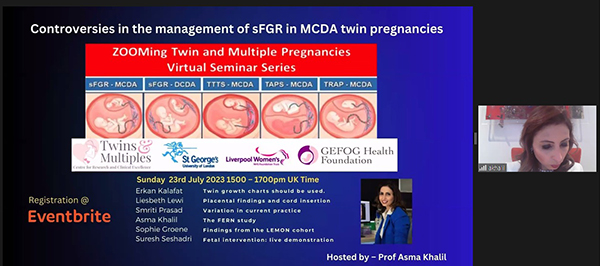
The FERN study aims to determine the feasibility of conducting a trial of active intervention versus expectant management in sFGR in MC twins. It will also examine women’s preference, clinicians’ preference, ethical dilemmas, current UK practice, number of cases per year, natural history of sFGR and key design elements required for a potential future trial.
To achieve these aims the study will use a mixed methods approach of 3 work packages.
Work Package 1
Will build on experiences from our recent survey of practice and the Twins Trust supported Twin-to-Twin Transfusion Syndrome (TTTS) registry to collect prospective data on the management and clinical outcomes of MC twin pregnancies complicated by sFGR. Twenty two UK Fetal Medicine Units will recruit 100 women with an MC twin pregnancy affected by early onset sFGR (<24 weeks). We will assess management strategies and clinical outcomes from routine practice. This will determine the natural history of sFGR, distribution of interventions and pregnancy outcomes.
Work Package 2
Will assess 25 parents’ and 25 clinicians’ management preferences via interviews and focus groups to identify ethical concerns and barriers to randomisation to management options. This information will be critically important in informing work package 3.
Work Package 3
Will utilise the information gained from work packages 1 and 2 to develop a consensus on a future definitive study. We will use Delphi methodology involving all stakeholder groups (patients, clinicians, funders and charities) to reach a consensus over two rounds. If appropriate, we will then be in a position to propose a specifically designed trial of active intervention versus expectant management for sFGR in MC twin pregnancy.
MC twin pregnancies complicated by sFGR have high rates of fetal morbidity and mortality. At present there is a lack of evidence to inform optimal management, particularly for early onset sFGR (<24 weeks).
Watch our videos below to find out more about the Fern Study.
Recent Events
Twin Webinar – Controversies in management of sFGR in MCDA twin pregnancies
162 attended a virtual Twin Webinar on 23/07/2023. Hosted by Professor Khalil and including both national and international speakers and attendees. The purpose of the webinar was to share current findings on the controversies of managing sFGR in MCDA twin pregnancies. The FERN Study including WP3 - Clinician Survey results were presented. The presentations were followed by Q&A plus discussion.

FERN WP3 Key Stakeholder Meeting
30 stakeholders attended the FERN WP3 Key Stakeholder meeting (hybrid participant - face to face or dial-in available) on 03/07/2023. The results of WP2, WP3 (clinician survey) and, alternative study designs were presented. The results and alternative proposed future study designs were discussed by the group. The purpose was to reach a consensus for a future study design that would be acceptable to both clinicians and participants. A summary of the meeting is being prepared for circulation.
Click below to read the latest FERN Study blog:
FERN Study blog June 2024
Chief Investigator: Professor Asma Khalil
Sponsor: University of Liverpool
Funder: National Institute for Health Research (NIHR) Health Technology Assessment (HTA)

Study Management: Harris Wellbeing of Women Research Centre
Status: Open

The FERN Study is open at 22 NHS sites throughout the UK and, the pregnancy and interview data being collected will provide an invaluable source of data for this type of twin pregnancy. Soon it will contribute to the design of a future clinical study and, in future years it will contribute to evidence for individuals to consider of typical outcomes when making decisions about the different management options that may be discussed during their pregnancy
Professor Asma Khalil Chief Investigator for the FERN Study

